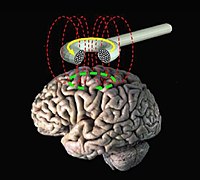
Photo from wikipedia
Cognitive impairment risk in Parkinson’s disease increases with disease progression and poses a significant burden to the patients, their families and society. There are no disease-modifying therapies or preventative measures… Click to show full abstract
Cognitive impairment risk in Parkinson’s disease increases with disease progression and poses a significant burden to the patients, their families and society. There are no disease-modifying therapies or preventative measures for Parkinson’s disease mild cognitive impairment (PD-MCI), or Parkinson’s disease dementia (PDD). This article reviews current and previously investigated treatments and those under investigation, including pharmacologic, non-pharmacologic and surgical procedures. There are currently no effective pharmacologic or non-pharmacologic treatments for PD-MCI. The only recommended treatment for PDD currently is rivastigmine, a cholinesterase inhibitor. Donepezil and galantamine—other cholinesterase inhibitors—are possibly useful. Memantine, a N-methyl-D-aspartate (NMDA) receptor antagonist, is considered investigational in PDD. Drug repurposing (atomoxetine, levodopa, insulin, atomoxetine for PD-MCI; ambroxol and ceftriaxone for PDD) and novel medications (SYN120, GRF6021, NYX-458 for PD-MCI; ANAVEX2-73, LY3154207, ENT-01, DAAOI-P for PDD) currently have insufficient evidence. There is growing research supporting exercise in the treatment of PD-MCI, but most non-pharmacological approaches have insufficient evidence for use in PD-MCI (cognitive rehabilitation, deep brain stimulation, transcranial direct current stimulation, transcranial ultrasound, vestibular nerve stimulation) and PDD (cognitive intervention, deep brain stimulation, transcranial alternating current stimulation, transcranial ultrasound, temporal blood brain barrier disruption). Research is needed for both disease-modifying and symptomatic treatments in PD cognitive impairment.
Journal Title: Behavioral Sciences
Year Published: 2021
Link to full text (if available)
Share on Social Media: Sign Up to like & get
recommendations!